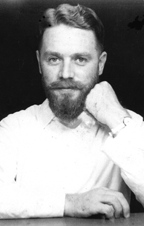 Berners
went to Bromsgrove School after being at Newcastle Royal Grammar
School. He then won an Exhibition to Worcester College Oxford, but
he did not take up his place until after the war; he joined up before
he should have. He was commissioned to a reserve of officers, finally
joining the Grenadier Guards. Berners had a tough war, suffering
from both gas and severe shell shock as many men did. He was very
sick and continued to be ill after being invalided out from the
war.
Berners
went to Bromsgrove School after being at Newcastle Royal Grammar
School. He then won an Exhibition to Worcester College Oxford, but
he did not take up his place until after the war; he joined up before
he should have. He was commissioned to a reserve of officers, finally
joining the Grenadier Guards. Berners had a tough war, suffering
from both gas and severe shell shock as many men did. He was very
sick and continued to be ill after being invalided out from the
war.
He went up to Worcester College with his Exhibition and read History.
He then went to Cuddesdon College and was ordained. His first curacy
was in Kidderminster where he lad a typical first curacy of learning.
He then became Lecturer [senior curate] in Bolton in Lancashire.
He volunteered himself to SPG as Giles had done, only for missionary
service, and was sent to a large SPG boys school, the Bishop Westcott
Boys School as headmaster. It was in a poor diocese of Chota Nagpur
at Nam Kum. He married Barbara Browning, a lady who had been on
the same boat as him from England; she joined his staff after working
in Bombay for a short while. Their two eldest children were born
at Nam Kum, John and Julian. In 1935 he took his first leave back
to England.
On his return to India hebecame Principal of the Lawrence Memorial
Royal Military School in Lovedale, 1700 feet up in the Nilgiri Hills
in South India, where his last three children,
Tom, Tony and Joan, were born, and where
he worked until his death. The Lawrence brothers and been generals
at the time of the Indian Mutiny. After their death the nation wanted
a memorial to them devoted to help their men. Schools were therefore
established in healthy climates for children whose parents had served
or were serving under the crown. Lovedale in South India was chosan
for the Lawrence brothers' school. It was military based, and the
boys all did drill and wore uniforms. Before Berners came to Lovedale,
it was all a bit of a shambles - one man had stayed too long, and
another had been too relaxed. Berners built it up to a first-class
school, so much so that he established co-educational teaching instead
of having two separate schools. On arriving a the school the Quartermaster
or Bursar asked Berners what his cut was going to be on the school
fees. Berners was absolutely furious and had to clear it up. This
was an example of the shambles he had to cope with on arriving at
the school.
Berners had been on the short list to become the Bishop of Madras.
He withdrew his name because the incoming bishop would have had
to handle the beginning of the Church of South India [the union
of denominations in India]. As a result of the war, Berners was
subject to nervous terror and nightmares and like man others he
suffered a relapse when France fell in 1940. He was very shaken,
so Barbara took him away on holiday where he recovered. When he
returned he opened a branch at the school for boys who could not
return home in the holiday during the Second World War.
Berners had always suffered from appendix problems and several times
he had suspected appendicitis. As a result of his shell-shock he
refused to have the operation for fear of the anaesthetic. He had
been told he would continue to suffer from the effects of the war
until he was about 45, when suddenly he would get over it. After
spending a weekend with Faith at a missionary station, he told her
that next time his appendix played up he would face the operation.
It was the year he was going to be 45. He told the teachers at the
beginning of the term he was going into hospital. Under the first
breath of anaesthetic he died.
Berners was the tallest and most handsome of all the family, and
he shared a colossal sense of humour, similar to his father. He
was a very charming and sensitive man towards himself and others.
He was apt to take things very hard. He took his job seriously,
and was a very successful headmaster in both schools. Berners was
a high churchman and a wonderful preacher. His sermons were simple
direct and humorous, but not playing for laughs. There was always
some thing to be taken out and learnt.
Family
Page

